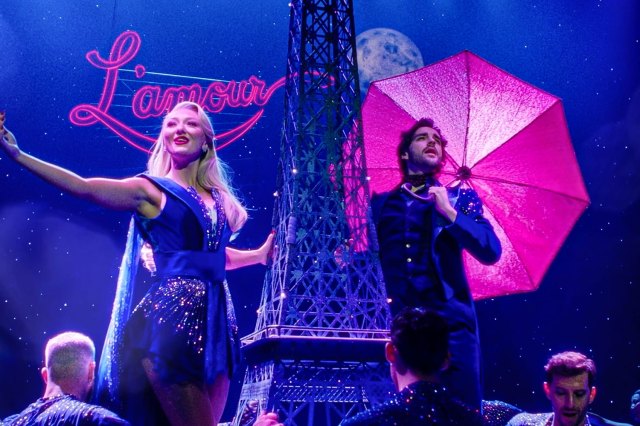Speed-the-Plow
Twenty years old now, and first seen in New York with Madonna driving a wedge between two best buddies in the movie business, David Mamet’s Speed-the-Plow has lost none of its bravura brilliance or ironic take on Hollywood creative morality.
In Matthew Warchus’s crackling revival, Jeff Goldblum and Kevin Spacey prove the hottest double act in town. Bobby Gould (Goldblum) is a newly promoted studio mogul whose sidekick – they started out in the mailroom together – the desperate, dishevelled Charlie Fox (Spacey), has hooked a big star from a rival studio with the bait of a prison movie with lots of sex, violence and titillation.
The snap and urgency of the situation comes from the star’s insistence that the project is given the green light within 24 hours. This becomes a problem when the head honcho, the unseen Ross, disappears on other business and delays the decisive meeting until the next morning.
Goldblum is about eight feet tall and as elegant as a heron. His stage movement is fantastic, a sort of hip-swivelling shimmy with finger-clicks and fancy footwork while Spacey bounces around after him like an untrained puppy. I see a lot of Spacey’s hero, Jack Lemmon, in this performance, its slouch and panic-stricken small-mindedness. Hardly letting each other complete a sentence, the impact is electrifying.
Then, randomly baiting the new temporary secretary Karen (Laura Michelle Kelly) and riding a bet from Charlie that he won’t sleep with her that very night, Bobby throws her the book of another potential property, a novel by “an Eastern sissy writer” about radiation and the end of the world, and asks her to give it a “courtesy read”.
In the second of three long scenes – total playing time 90 minutes – Karen nearly changes Bobby’s mind and his life. She loves the book. She burns with its redemptive power. Shaken and disturbed – and laid – Bobby returns to the office and tells Charlie he’s switching horses.
Goldblum now looks like a man hit by a truck. And his pristine white office, in decorative transition of builders’ ladders and boxes of scripts, becomes a savage battleground as Spacey explodes in demonic fury. While the show’s main weakness is the lack of fire power in Kelly’s messianic central speeches – she looks absolutely gorgeous but is frankly over-parted – it soon recovers in this final, shattering section.
Rob Howell’s sleek design, lit with provocative extremes of shade and brightness, by Paul Pyant, matches the performances perfectly. Warchus’ revival is infinitely better than the National premiere in 1989 and more exciting than the West End version eight years ago. But I wonder why nobody thought of adding Mamet’s Bobby Gould in Hell (1989) as a coda – and an encore?
– Michael Coveney












